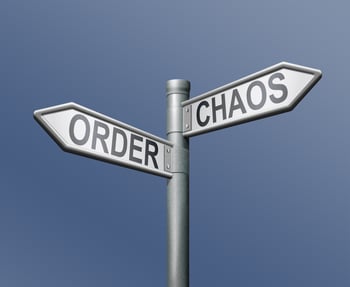Great Disruptive models all start with Chaos
There is a lot of attention right now on start-ups, supporting young entrepreneurs and the financing that can take the next big idea to glory. There’s also no shortage of mature businesses that still have an awful lot to offer. If there was one thing that was synonymous about the successes in all of these groups, it's the ability to organize chaos for their customers.
The fascinating thing about chaos is that it's everywhere and usually behind the veil of a "routine" that we’re just used to suffering through. Solving the suffering is also part of the theory behindRevolution Delivery, but the underlying driver is chaos.

Models That Organize Chaos Have Been Around For a Long Time
- An investment advisor organizes the chaos around trying to pick and choose investments. Even something as low tech as consulting, brings in expertise and structure to organize business chaos.
Click Here for a Free Preview of Digital or Death
New and Not So New Models That Organize Chaos Are Everywhere
- Uber Uber Uber… yeah, yeah, yeah. We all know the story, but a company like Uber organizes the chaos of flagging down a taxi, arguing with the cabby about taking a credit card, and then having to figure out a tip. Lots of chaos.
- Amazon has taken the chaos out of shopping.
- CRM systems organize all the chaos around keeping track of our customers, and then marketing automation took it a step further and organized all the chaos around prospecting leads, nurturing them and turning them into customers.
- Social media takes the chaos out of having to stay in touch with so many people. This of course ads a whole new level of chaos, but that’s a story for another day.
All of these things and people, not only organize chaos, but create bankable value we can feel in our wallet and stress levels.
Disruption isn’t chaos, it’s the solution.
Every new idea that we hear about from entrepreneurs is about disruption. However, it’s important to understand that disruption itself is not the chaos, it is the solution to the chaos.
For instance, take something as simple as banking. Lots and lots of chaos there. A company like ING Direct (now called Tangerine...coincidentally from the same branding company that came up with Blackberry — what will happen to these people when they run out of fruit.) took the chaos out of going to the bank by having an “online only” model. Sure everyone jumped on that disruption bandwagon in some form or another making it less novel over time, but in the end it was the first solution to banking chaos. The customer’s received better savings rates and less fees and the bank itself managed a very light infrastructure. Hence, a very nice disruptive solution to chaos. Endless examples of this, but you see the point. You can’t have a disruptive solution without having some sort of chaos to organize.
If Profitable Disruptive Businesses Had a Formula, Here is What It Would Look Like.
Chaos / Chaos Solution = Level of Control = Excited Customers
The Solution is Control
The reason every entrepreneur is searching for disruption, is that it provides steady waters in a boiling sea of chaos. In short, they give us a modicum of control in something that we never had control over, and many times, never knew how much we wanted it until we had it.
Remember running back to the office to check your email, going to the bank to deposit a check, waiting at home for a phone call and in fact, having to communicate with someone live over the phone instead of just sending a quick SMS? All of those things were situations that were out of your control, meaning, they ended up dictating or altering your behaviour. You were an easy target back then because those situations were heavy on chaos and light on control. Any time control is given back, we will gobble it up like Apple shares on the news Steve Jobs has come back from the dead.
If you want to assure your business is going to survive into the future, you need to keep asking:
- - Are we solving chaos?
- - Are we giving back control?
- - Are we spending time on solving future chaos?
If you are, you’ll survive. If you’re not, you’re just part of the chaos and you should prepare to be disrupted right out of business.
Want to learn how to be a disruptor and not a business casualty? Download a free preview of Digital or Death to learn, transform and profit.





